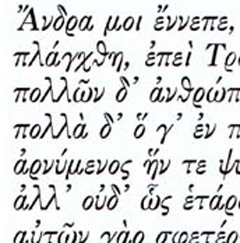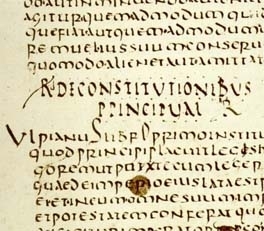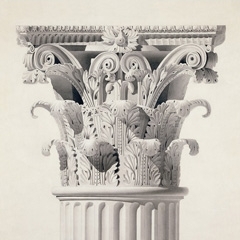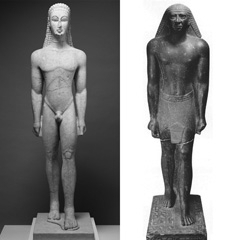Courses (through 2015-16)
PLEASE NOTE:
IN 2015-16 the Department thoroughly revised the curriculum of the program in Classics.
- Course numbers and descriptions as they appeared in 2015-16 are detailed below.
- Course numbers and descriptions valid from 2016-17 are detailed here.
Consult the GVSU Catalog for course numbers and descriptions as they appeared in a particular academic year.
Courses offered by the Department of Classics
- Courses in Ancient Greek (GRK)
- Courses in Latin (LAT)
- Classical Civilization courses (CLA)
- Courses offered by related programs
- Classics Courses that fulfill General Education requirements
- Classical civilization courses offered by the Honors College (HNR)
Courses in Classics are designed to meet the needs of a variety of students.
All of the courses offered by Classics share an emphasis on encountering the classical world through primary sources, both textual and material. Complementing this emphasis is the study of the living tradition that has shaped - and continues to shape - the way in which we construct our world today.
Courses in Latin and Ancient Greek fulfill the university's foreign language requirement, while classical civilization courses fulfill many General Education and Honors requirements.
Many find that working with the classical languages improves their grasp of English and their skills as readers and writers.
The Department offers courses in ancient Greek (GRK), in Latin (LAT), and in Classical Civilization (CLA). All courses are taught in English. Language courses stress reading comprehension rather than speaking. No course requires attendance at language labs.
See also courses offered by related programs.

Greek is the language of Homer and Sappho, of Aeschylus and Aristophanes, of Herodotus and Thucydides, of Plato and Aristotle, and of the New Testament.
GRK
Ancient Greek
GRK 101 Elementary Ancient Greek I. An introduction to ancient Greek vocabulary, grammar, and syntax with an emphasis on reading works from the Homeric and classical periods. Four credits. Offered fall semester.
GRK 102 Elementary Ancient Greek II. Continuation of GRK 101. Language work will be supplemented with discussions of ancient Greek history and culture. Prerequisite: Completion of GRK 101. Four credits. Offered winter semester.
GRK 201 Intermediate Ancient Greek I. Continuation of GRK 102. Reading of an entire dialogue by Plato, such as the Apology or Crito. Prerequisite: Completion of GRK 102. Four credits. Offered fall semester.
GRK 202 Intermediate Ancient Greek II. Readings from Homer's Iliad or Odyssey, supplemented by study of early Greek history and culture. Prerequisite: GRK 201. Fulfills World Perspectives requirement. Three credits. Offered winter semester.
GRK 301 Introduction to Ancient Greek Literature. Survey of ancient Greek literature after Homer, including authors such as Sappho, Sophocles, Herodotus, and Plato, and passages from the New Testament. Special attention to the development of different forms of writing in Greek (lyric, drama, history, philosophy) and to what the texts tell us about Greek society. Prerequisite: GRK 202. Three credits. Offered fall semester.
GRK 302 Euripides. An introduction to ancient Greek drama, through a close reading of one of Euripides' tragedies, such as Alcestis, Medea, or Hippolytus. Special attention to the social, religious, and political context of the performances, and to the staging, including the use of chorus, song, and spectacle. Prerequisite: One 300 level Greek course. Three credits. Offered winter semester.
GRK 351 Greek Prose. Reading of philosophical, oratorical, or historical texts, such as Plato's Symposium, Lysias' court speeches, or Herodotus' Histories. Emphasis on the originality of the forms of prose that helped shape the Western tradition: the philosophical dialogue, the reflection of ordinary lives in oratory, and history as cultural anthropology. Prerequisite: GRK 202. Three credits. Offered fall semester.
GRK 352 Greek Lyric Poetry. Survey of Greek lyric poetry in various meters and dialects, designed for both choral and solo performance. Authors include Archilochus, Sappho, and Simonides. Special attention to the themes of love, sexuality, and death, and to the status of lyric as social commentary and philosophical reflection performed in public. Prerequisite: One 300 level Greek course. Three credits. Offered winter semester in even-numbered years.
GRK 380 Special Topics in Greek. Readings, lectures, discussions, or laboratories (or any combination) on specific topics in Greek. Offered on sufficient demand. Prerequisite: GRK 202 or permission of the instructor. Three credits.
GRK 399 Independent Reading. Supervised independent reading in Greek. Topic, credit, and time must be arranged with individual faculty member before registration. One to three credits. Offered fall and winter semester.
GRK 401 Greek Drama. Study of Aeschylean or Sophoclean tragedy or Aristophanic comedy in the cultural, historical, and theatrical contexts of Athenian drama. Topics include the staging of the plays, the emotional effects of tragedy or comedy, drama's function as political and social commentary, and the linguistic complexities of imagery and word-play. Prerequisite: One 300 level Greek course. Three credits. Offered fall semester.
GRK 402 Greek Narrative. Study of Greek narrative in poetry or prose, from such texts as the Homeric Hymns, Homer's Odyssey, Thucydides' Peloponnesian War, or the New Testament. Prerequisite: One 300 level Greek course. Three credits. Offered winter semester in odd-numbered years.
- Courses in Latin (LAT)
- Classical Civilization courses (CLA)
- Courses offered by related programs
- Classics Courses that fulfill General Education requirements
- Classical civilization courses offered by the Honors College (HNR)

Even after the Roman Empire collapsed, Latin continued as the language of literature, science, philosophy, medicine, law, and religion for over a thousand years.
LAT
Latin
LAT 101 Elementary Latin I. An introduction to Latin vocabulary, grammar, and syntax with emphasis on the language of the classical period. Four credits. Offered fall semester.
LAT 102 Elementary Latin II. Continuation of LAT 101. Prerequisite: Completion of LAT 101. Four credits. Offered winter semester.
LAT 201 Intermediate Latin I. Continuation of LAT 102. Introduction to the study of selected ancient authors. Prerequisite: LAT 102 or appropriate high school background. Four credits. Offered fall semester.
LAT 202 Intermediate Latin II. Readings in Virgil's Aeneid, supplemented by study of the history and culture of Augustan Rome. Prerequisite: Successful completion of LAT 201, or appropriate high school background. Fulfills World Perspectives requirement. Three credits. Offered winter semester.
LAT 302 Ovid. Introduction to Ovid's poetry through close reading of selections from the erotic poetry, the Metamorphoses, the Fasti, or the exile poetry. Topics include the social and political context of Ovid's poetry, gender roles and relations between the sexes, satire and humor, and Ovid's poetic response to the policies of Augustus. Prerequisite: One 300 level Latin course. Three credits. Offered winter semester in even-numbered years.
LAT 350 Roman Literature and Culture. Readings of selected works from early Latin through the Imperial age with the aim of developing reading proficiency and integrating the works within their cultural context. Special attention to the ways in which literature both reflects and shaped Roman cultural values and institutions. May be repeated once if content changes. Prerequisite: LAT 202. Three credits. Offered fall semester during odd years.
LAT 351 Latin Prose. Readings from the works of authors such as Cicero, Livy, Seneca, and Tacitus, in genres such as oratory, history, philosophy, and epistolary writing. Attention to the development of genre and to the ways in which Latin prose has helped shape the Western tradition. May be repeated once if content changes. Prerequisite: LAT 301 or permission of the instructor. Three credits. Offered fall semester.
LAT 352 Roman Drama. An introduction to Roman drama through a close reading of the comedies of Plautus or Terence or the tragedies of Seneca. Particular attention to the social context, language, and stagecraft of the plays, to their techniques of characterization, and to their place within the wider traditions of western drama. Prerequisite: One 300 level Latin course. Three credits. Offered winter semester in odd-numbered years.
LAT 353 Latin Prose Composition. Study of Latin syntax and prose style, with emphasis on introductory prose composition and reading select prose models (Sallust, Cicero, Seneca, Pliny, Tacitus). Special attention to broad grammatical structures, complex syntax, and stylistic variations. Prerequisite: LAT 351. Three credits. Offered winter semester, odd years.
LAT 362 Medieval and Renaissance Latin. An introduction to Medieval and Renaissance Latin through the close reading of authors such as Augustine, Bede, Hrotsvitha, Petrarch, Pontano, and Erasmus. Special attention to the linguistic features of post-classical Latin and to the development of different forms of writing, including autobiography, drama, history, philosophy, and lyric poetry. Prerequisite: One 300 level Latin course. Three credits. Offered winter semester in odd-numbered years.
LAT 380 Special Topics. Course content varies. Refer to schedule of classes to determine course description and prerequisites. Students may repeat this course under different topics. One to four credits.
LAT 399 Independent Reading. Supervised independent reading in Latin. Topic, credit, and time must be arranged with individual faculty member before registration. One to three credits. Offered fall and winter semester.
LAT 401 Roman Poetry. Readings from the works of Roman poets such as Catullus, Lucretius, Virgil, Horace, and Juvenal. Topics include attitudes toward love; the relationship of poets and their patrons; war, power, and politics, poetry as a vehicle of social commentary; and the response of the Roman poets to Greek literature and philosophy. Prerequisite: One 300 level Latin course. Three credits. Offered fall semester.
LAT 404 Latin Narrative. Study of Latin narrative in verse or prose, in genres such as epic poetry (Ennius, Virgil, Lucan), the Roman novel (Petronius, Apuleius), biography (Suetonius), and historiography. Special attention to the evolution of narrative forms, and to narrative as a vehicle of social commentary. Prerequisite: One 300 level Latin course. Three credits. Offered winter semester during even-numbered years.
- Courses in Ancient Greek (GRK)
- Classical Civilization courses (CLA)
- Courses offered by related programs
- Classics Courses that fulfill General Education requirements
- Classical civilization courses offered by the Honors College (HNR)

All of the courses offered by Classics share an emphasis on encountering the classical world through primary sources, both textual and material. Complementing this emphasis is the study of the living tradition that has shaped - and continues to shape - the way in which we construct our world today.
CLA
Classical Civilization
CLA 101 Greek and Roman Mythology. An introduction to the gods and heroes of ancient Greek and Roman myths in their cultural and historical contexts, as well as their modern influence. Fulfills Philosophy and Literature Foundation. Three credits. Offered fall semester.
CLA 121 Greek Civilization. An introduction to the major cultural accomplishments of ancient Greece from the Bronze Age through the death of Alexander the Great. Emphasis on Greek literature, art, philosophy, and political institutions both in their historical contexts and as achievements of continuing importance in the contemporary world. Fulfills Historical Perspectives Foundation. Three credits. Offered fall semester.
CLA 131 Introduction to Roman Civilization. An introduction to the major accomplishments of ancient Rome from the Iron Age to Late Antiquity. The course examines significant aspects of Roman political, social and cultural life, both in their primary context and in terms of their relevance to society today. Fulfills Historical Perspectives Foundation. Three credits. Offered winter semester.
CLA 180 Special Topics in the Classics. Readings, lectures, discussions, or laboratories (or any combination) on specific topics in the Classics. Offered on sufficient demand. Three credits.
CLA 201 Classical Literature. Great works from the ancient world in translation, selected from the Homeric epics, plays of Aeschylus Sophocles, Euripides, and Aristophanes, and from such other classic works as Virgil's Aeneid, the Bible, and Eastern epics such as Gilgamesh. Prerequisite: Fulfillment of the Freshman Writing Requirement. Three credits. Offered fall and winter semester. Fulfills Philosophy and Literature Foundation.
CLA 250 Classical Art and Archeology. Survey of the art and archeology of the classical world from the Bronze Age through the dissolution of the Roman Empire. Emphasis on the development of the characteristic forms of classical art, the aesthetic and historical contexts of specific works, and the techniques of classical archeology which have revealed them. Fulfills Arts Foundation. Prerequisite: Fulfillment of the Freshman Writing Requirement. Three credits. Offered winter semester.
CLA 275 Ancient Drama. A study of the drama of ancient Greece and Rome, from playwrights such as Sophocles, Euripides, Aristophanes, and Plautus. Readings of tragedy and comedy will be augmented by considerations of ancient dramatic theory and the possibilities of performance on the ancient and modern stage. All works read in English translation. Fulfills Arts Foundation. Prerequisite: Fulfillment of the Freshman Writing Requirement. Three credits. Offered fall semester.
CLA 311 Ancient Great Philosophers. A study of one or several ancient great philosophers, such as the pre-Socratics, Plato, Aristotle, Lucretius. Focus will be on the philosophers' writings, but attention will also be given to context and tradition. May be repeated if content differs. Prerequisite: Prior work in philosophy or permission of instructor. Three credits. Offered Fall and Winter semesters.
CLA 315 Ancient Religion. A study of the religious beliefs and practices of the ancient world, emphasizing the religious traditions of Greece, Rome, Egypt, and the Near East. Topics include views of the afterlife, temples and sanctuaries, religion in daily life, "mystery" religions, and the rise of the monotheistic religions of Judaism and Christianity. Part of Religion Theme. Prerequisite: Fulfillment of the Freshman Writing Requirement. Three credits. Offered fall semester.
CLA 320 Women in the Classical World. Introduction to women's lives and gender relations in ancient Greece and Rome, in both the private world of the family and the public sphere of religion and politics. Topics include myths about women; how legal, medical, and philosophical texts represent women; and what women say about themselves in their writings. Part of Gender, Society, and Culture Theme. Prerequisite: Fulfillment of the Freshman Writing Requirement. Three credits. Offered winter semester.
CLA 345 Tradition and Reception. Study of specific classical authors or genres of classical literature or art and the ways they have been understood, adapted, and transformed in new cultural environments of later periods. The course may consider authors such as Sappho, Aristotle, and Virgil, or genres such as epic, comedy, lyric, and temple architecture. May be repeated for credit when content varies. Prerequisite: Fulfillment of the Freshman Writing Requirement. Three credits. Offered fall semester in odd-numbered years.
CLA 350 Issues in Classical Archaeology. Advanced study of current issues in Classical Archaeology, based on multidisciplinary approaches to topics such as ethnicity, cult, technology, economy, provincial identities and imperial propaganda. Particular attention to synthesis of archaeological, art-historical, literary, and anthropological models and interpretive methods. May be repeated for credit when content varies. Three credits. Offered fall semester in odd numbered years. Prerequisites: CLA 250, or HNR 221/222, or permission of the instructor.
CLA 365 Stoicism, Identity, and the Happy Life. This course will address, through the life and thought of prominent Stoics, both the evolution of self and the development of an individual’s identity from the Stoic perspective. Through readings, writing, and journaling, students will explore the significance and relevance of key Stoic ideas about identity. Part of the Identity Issue. Prerequisite: Junior standing.
CLA 367 Thinking Like a (Roman) Lawyer. Many legal concepts we take for granted come directly from Roman Law, the influence of which continues to be felt worldwide today. This course introduces legal reasoning and analysis through a discussion-based, case-by-case approach focusing on primary sources in translation. Especially valuable for prelaw students. Part of the Human Rights Issue. Prerequisite: Junior standing.
CLA 380 Special Topics. The study of special topics or areas in Classics and the Classical Tradition not offered in the regular curriculum. May be repeated for credit when content varies. Three credits.
CLA 410 Literary Translation: Theory and Practice. An introduction to the theory, practice, and art of translating poetry, prose, and drama. In a workshop format, students translate texts into English from their choice of ancient or modern languages, and study the history, theory, and the social, cultural, and political contexts of translation. Prerequisite: One 200 level course in any non-English language. Three credits. Offered winter semester in odd-numbered years.
CLA 461 Studies in the Classical Tradition. Examines the relationship between classical civilization and a specific region, period, or intellectual movement of the non-classical world. Emphasis on how the Classics and classical cultures were understood and exploited in different cultural environments, such as medieval Spain, the Renaissance, the American Enlightenment, Modernism, or post-colonial Africa. May be repeated for credit when content varies. Prerequisite: Junior standing. Three credits. Offered fall semester in even-numbered years.
CLA 479 Classical Theater Workshop. Rehearsal and public performance of a play selected from the repertory of ancient Greek and Roman drama. Cross-listed with CTH 479. Students may not receive credit for both classes. Three credits. Offered winter semester in even-numbered years.
CLA 495 Notions of the Classics (Capstone). A critical examination of the concepts of "the Classics" and "Classicism" as a context for the contemporary field of Classics, emphasizing the shifting range of the terms and the different ways both they and the classical world have been and can be understood, adapted, and transformed. Required of all Classics majors. Prerequisite: Senior standing. Three credits. Offered winter semester.
CLA 499 Independent Study and Research. Supervised individual research in an area of interest to the student which culminates in a research paper. Prerequisite: Junior standing and the permission of the instructor supervising the research. One to three credits. Offered fall and winter semester.
- Courses in Ancient Greek (GRK)
- Courses in Latin (LAT)
- Courses offered by related programs
- Classics Courses that fulfill General Education requirements
- Classical civilization courses offered by the Honors College (HNR)

Courses offered by related programs
Students interested in Classics should also note the following courses offered by related programs:
ANT 215 Origins of Civilization
ANT 220 Introduction to Archaeology
ANT 350 Archaeology of the Middle East
COM 203 Argument and Analysis
ENG 204 Mythology
HST 345 The Ancient Mediterranean and Orient
HST 350 Classical Greece and Rome
HNR 211/212 Classical World I
HNR 221/222 Classical World II
HNR 300 Classical Mythology
PLS 231 Classical Political Thought
- Courses in Ancient Greek (GRK)
- Courses in Latin (LAT)
- Classical Civilization courses (CLA)
- Classics Courses that fulfill General Education requirements
- Classical civilization courses offered by the Honors College (HNR)

